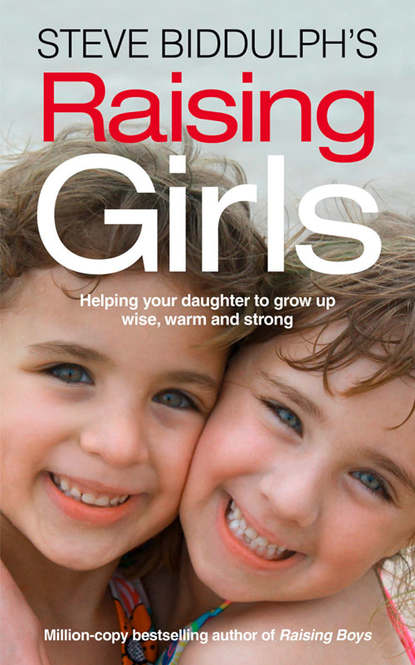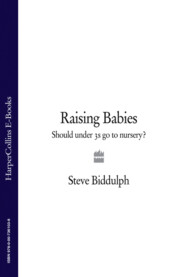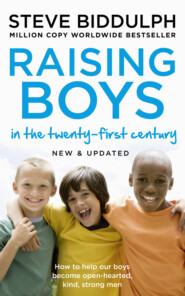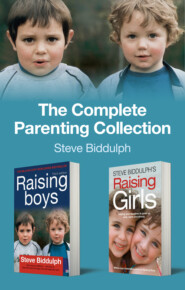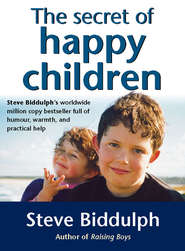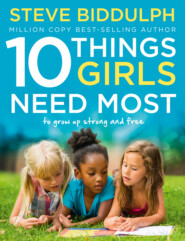По всем вопросам обращайтесь на: info@litportal.ru
(©) 2003-2024.
✖
Steve Biddulph’s Raising Girls
Автор
Год написания книги
2018
Настройки чтения
Размер шрифта
Высота строк
Поля
Other children, other adults, as well as Mum and Dad, brothers and sisters, can be difficult but are mostly fun. Your daughter finds that she can have better fun by sharing a little, giving way a little, co-operating and playing together, than if she is just on her own. This isn’t possible until about three or four years of age, and even then it’s hard. But by learning first from Mum or Dad, and then other people, she can work out that she is not the centre of the universe. Other people have feelings too.
Right through primary school, this most complex of skills – valuing yourself, but also valuing others and treating them with respect – is gradually being learned. Again, it builds on the earlier stages: being treated kindly, you grow kind; being treated sensitively, you grow empathy; being treated honestly, you grow honest.
She decides that mostly people are fine. I like them. Let’s play! Your daughter will be a ‘people person’. For the rest of her life she will know how to be with people in a happy and helpful way.
Stage 4: Finding her soul – Can I discover my deep-down self and what makes me truly happy? (10–14 years)
With the coming of puberty, a girl starts to experience a much stronger sense of being her own person, a separate and private self. She is far from being a woman, but she is no longer a child either. Like a tree in winter, she is building up reserves for when she is ready to blossom. These are the years in which she begins to strengthen the ‘inside’ of her deep self – who she really is. It’s a time when she needs help to think about what she stands for, and cares most deeply about, and also what her interests and passions are. Often at this age a girl finds her ‘spark’ – something that she loves to do and which gives her joy, purpose and a creative way to make a contribution. A reason to be alive.
By gaining an identity through doing and believing, and strengthening her inner world, a girl will be freer from the need for approval that haunts many teen girls and makes them conformist and dull.
A girl’s soul is like a wild animal, powerful and savvy, but wary too. It needs time and quiet to emerge. As a girl finds her soul, she will be equipped to face the big questions of life: choosing intimacy on her own terms, choosing her career path, knowing which peer group to hang around with. A girl who knows her own soul may be a gentle girl but also one who has steel in her, not easily manipulated by careless boys or false friends. She will be loyal, tough and protective of those around her. And of herself.
Stage 5: Stepping into adulthood – Can I take responsibility for my own life? (14–18 years)
At 18 your daughter begins to be a woman, and so at the age of 14 the preparation for that huge leap has to begin in earnest. It’s mostly practical – here’s how you manage money, driving a car, time, eating, clothes, health, safety – but it’s also a powerful shift in attitude. Sometime between 14 and adulthood a girl needs some kind of marker event, a growing-up rite, an experience or even misfortune which teaches her that she is now at the steering wheel of her own life. That she literally holds her life in her own hands. This is a frightening realisation, but frightening in a good way. By steadying herself, and by receiving the welcome and support of older women, she can leave behind childishness or harmful gullibility, and be accountable, connected to consequences and proactive in making her life worthwhile. While life itself can deliver this realisation to a girl, leaving it to chance is a hazardous and unreliable way for it to happen. She might come to serious harm. Also, some people never grow up and their lives are self-absorbed and wasted; they drift in misery, blame everyone else and never take responsibility.
Girls have to be deliberately and proactively launched into healthy womanhood. When this is done well, the results are impressive. A girl takes charge of her life and makes her unique way in the world.
Each Stage Asks a Question
I hope you’ll find the five stages clear and easy to understand. Remember that each girl is different, so the stages can vary quite a lot according to at what age they happen. Also, they overlap, because nature is efficient and starts one lesson while the other is still finishing. I hope you can live with that!
The key point is that as your daughter completes each stage, she comes to a decision about her life, which is going to either help or harm her. For example, imagine a girlhood where all five stages go badly. This girl would arrive at the following five decisions:
1 Life is uncertain, and nobody loves me.
2 New ideas and things are frightening.
3 People can’t be trusted, and they are impossible to get along with.
4 I have nothing of value inside me, I am a nobody.
5 Growing up is just too hard. I don’t want to be an adult. I don’t have any power or any choice in what happens to me. Stuff just happens.
Those are pretty bad outcomes, but they are familiar to anyone who works with girls. Every parent can look at their daughter, and her friends, and other girls in their town and city, and see the results of these stages being lived out. Some girls will make it, some will not. The decisions that girls make at each stage are profound and life-altering.
Fortunately (in case you are now paralysed with fear!), these decisions are made little by little, combining many experiences, so we shouldn’t panic about always getting things right. The stages last for years and we get lots of chances.
As a parent, what matters is that you don’t give up. Loving your daughter and keeping on trying are what will get you through. And if your daughter is already past some of the stages and you feel that she didn’t really get the message, don’t despair, those decisions can often be remade later.
Of course, if you have a new little baby daughter and she is the reason you are reading this book, then you are lucky indeed. But at any age, if you have enough caring and motivation, then you can still put things right.
GIRLS DO IT DIFFERENTLY – AND FASTER
Girls develop more quickly than boys, especially in brain abilities. The oestrogen their body creates while still in the womb actually increases the rate of brain growth, and at birth they are many weeks ahead of boys.2 (#litres_trial_promo)
The difference increases in the first five or six years. Girls learn to speak whole sentences and control their fingers, to do neat drawings or even writing, six to twelve months sooner than boys. Girls are ready to start school about a year earlier than boys. Girls do not suffer as much separation anxiety as boys if they have to go to childcare – although this varies a lot with the individual child.
Girls enter puberty about two years sooner than boys do, turning into young women overnight when the boys seem to be standing still. And finally, they become adult sooner – girls’ brain development finishes several years before boys finally get there in their early twenties! It’s as if Nature says to girls: you’d better grow up ahead of the game, you will need your wits about you!
THINK OF YOUR OWN LIFE
If you are a mother, you have a huge advantage in raising a daughter – you used to be one. If you are a dad, it’s different, but daughters don’t expect their dads to be their mums, usually, so it’s all right, you have a different part to play that is just as important.
If you’re a mum reading this, think back to your own childhood. (It’s still worth doing this if you’re a dad, though the stages would have been somewhat different …)
Did you feel safe and secure when you were a baby? Were your parents in a good place in their lives and able to really love and enjoy you?
Were you encouraged to play, enjoy and explore the world around you? Did your parents have the time and interest to excite you and show you how good life was as a toddler?
When you went to school, did your parents help you and show you how to get along with others? Could they get along with others themselves? Could they look out for themselves but also respect the needs of others?
Did you find in your early teens that your unique interests were supported, or were people too busy?
Did you find in your mid-teens that you could get to know your own soul and connection to Nature and the universe, and be strengthened in this?
And finally, in your late teens, did you have a clear transition to being adult, where you felt that you took control of your own life, faced the consequences of your actions, and had a sense of power as well as a purpose?
Lots of questions, but you will quickly work out where you did okay and where things fell down. Perhaps that will help you know how to get it right for your daughter, and how important that is.
Using the Stages
You use the stages by asking, what age is our girl? What is the most likely big question that her life is asking, according to the stages listed above? (Always check with your own experience, rather than letting books or theories dictate your actions.) If your gut feeling is that this IS the stage she is in, you can organise the experiences and inputs to help her along. We will teach you how in the chapters to come.
Another use of the stages is ‘remedial’; you can pinpoint the earlier stages that she might have missed out on, due to difficult circumstances. The nature of human beings is that we can often recover things that we missed out on, by getting them down the track. For example, adopted children from terrible backgrounds can gradually find security with their new parents. Overprotected girls who are fearful can be challenged and coaxed to show more courage. Girls with no people skills can learn to get along better, and so on. Be open to the possibility that your daughter may be a certain age in years, and a far younger age in development, if she missed out due to life circumstance during the earlier parts of her ‘quest’.
CLINGY FOR A REASON
Gemma, aged ten, is very clingy and always needs cuddles and closeness from her mum.
At first, her mum finds this annoying, but then she remembers something – that she was very stressed and suffered depression when Gemma was a baby. She realises that Gemma, though really in Stage 3, is going back to complete her Stage 1 ‘Am I loved and safe?’ She decides to really give Gemma all the hugs that she seems to need, and finds that it makes a huge difference. Her daughter relaxes more and becomes much more confident and independent within a couple of months.
UNDER STRESS, WE ALL REGRESS!
Here’s a handy tip. Sometimes when a family is under stress, kids will deal with this by dropping back a stage. A confident five-year-old will suddenly suck her thumb and want to wrap herself up in a blanket. A 14-year-old would rather hang out with you at a party or barbecue than mix with the other kids. Or a 21-year-old will refuse to make a decision for herself and want to be told what to do.
Under stress, we all drop back a stage or two – think of those times when you just don’t want to get out of bed, or just don’t want to deal with people. That’s quite normal from time to time. Generally, let your daughter regenerate and recuperate in this way – nobody can handle reality all of the time. You only need to worry if she doesn’t seem to ‘grow up’ after a few days. She might need nudging out of it, or some more help to find out what is wrong.
Be sure you find out the reason why she is stressed, if there is no obvious explanation. There may be something she needs to tell you that she is finding hard to talk about.
Be gentle on yourself, too, so she can see that everyone needs nurture and to slow down. Lowering your whole family’s stress levels with holidays, having one day of the week as a rest day, and less overscheduling generally, means that she won’t be as likely to go into overload. Often a stressed child is an indicator that the whole family needs to slow down.
In a Nutshell
All girls go through five stages to become a woman.
These stages teach her the five big lessons of growing up: being secure, learning to explore, relating to other people, finding your soul, and taking charge of your life. Adult help is needed for all of these, and the adults have to know what to do.





